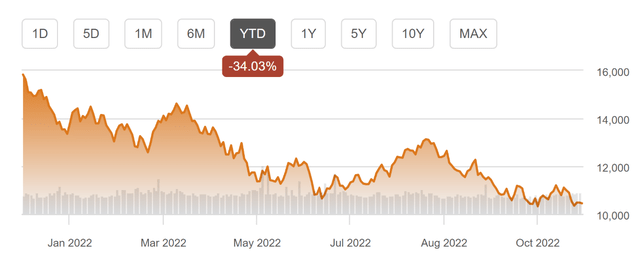
hh5800
hh5800
It looks like QUALCOMM Incorporated (NASDAQ:QCOM) is racking up another strike for its anticompetitive behavior. In 2019, U.S. District Judge Lucy Koh wrote that Qualcomm coerced unreasonably high royalties to “strangle competition,” and it appears that very little has changed since then given Qualcomm’s irrational refusal to abide by its contracts with its most important technology supplier. Let’s take a look at why the world’s inventors and investors are expressing their concern.
Inflation, out-of-control energy prices, the war in Ukraine, and numerous other problems have eroded trillions of dollars in wealth so far this year, but no index is hemorrhaging like the NASDAQ. While tech stocks boomed during COVID shutdowns – as everyone binged shows, worked from home, and ordered food online – 2022 is a different story.
Year to date, Apple Inc. (AAPL) is down 25 percent, Alphabet Inc. (GOOG, GOOGL) 40 percent, Amazon.com, Inc. (AMZN) 50 percent, Netflix, Inc. (NFLX) 60 percent, and Meta Platforms, Inc. (META) is past the point of no return at 80 percent!
With those big boys hurting as bad as they are, it’s no surprise the broader index has lost one-third of its value this year.

NASDAQ Nov 2021-Nov 2022 (Seeking Alpha)
NASDAQ Nov 2021-Nov 2022 (Seeking Alpha)
U.S.-based technology stocks have driven the incredible growth of the last 20 years, with more wealth created than at any other time in human history. It’s in no one’s interest for the NASDAQ to bleed – er, leak – like this. It’s certainly no time to start mucking up what led to this growth: American intellectual property infrastructure.
America’s robust system of patent protection is what propels inventors to pour their precious time and brainpower into an idea and investors to do the same thing with their precious capital. Both get the assurance that if they take a risk on the next big thing, they will be rewarded. That reward nearly always involves reliance on a specific form of contract – a patent license agreement.
As one genius, billionaire, playboy, and philanthropist put it, “That’s how dad did it, that’s how America does it, and it’s worked out pretty well so far.”
This is why it is fair for all inventors and investors to be concerned when tech companies – particularly in high-stakes industries like the semiconductor space – threaten to derail the patent system for their own gain.
For years, Qualcomm has built its products around Arm’s critical intellectual property. Using designs licensed from Arm, the British chipmaker owned by SoftBank, it markets various system on a chip (SOC) products. Arm’s foundational technology makes these products faster with less power consumption – a critical advantage in the world of mobile computing. But these multinational semiconductor companies recently sent their lawyers into battle with each other. It culminated in a lawsuit in which Arm sued Qualcomm for breach of contract and trademark infringement.
The dispute started when Qualcomm acquired Nuvia in 2021, a fellow tech company that had a separate Architecture License Agreement (ALA) with Arm for designing custom processor cores. (Legalese for those who want it here. Seeking Alpha analysis of the acquisition here.)
Now, ALAs are relatively rare and come with specific legal requirements, which Qualcomm and Nuvia were legally obligated to satisfy. Only through strict compliance could Nuvia transfer its rights and designs to Qualcomm. Arm’s legal filings argue that they didn’t and now both Nuvia and Qualcomm have lost the ability to use Arm’s technology reflected in the Nuvia designs. Here is just some of what Arm’s complaint lays out:
This analyst may not have a patent law degree, but it all looks pretty bad for Qualcomm – and its investors – if it’s true.
Notably, Qualcomm isn’t arguing that the relevant Arm technology is not valid or that it is not using it. Qualcomm (and the semiconductor ecosystem) has been building its business around it for years. And no one appears to be debating whether Nuvia’s license disappeared. In the United States and around the world, that means you have to stop using the innovator’s IP.
When you stick to the facts, it is clear: this is an IP dispute first and foremost.
To that end, the smart money is that the court system will find that Arm is just protecting its IP, which is what any responsible company is obligated to do in a position like this, particularly when blatant violations damage the company and its stakeholders. And Arm isn’t seeking money, new fees, or new royalties – just the protection of its intellectual property.
Indeed, Arm is not just doing what’s right for them, but what’s right for the entire ecosystem. No company should take another company’s IP without a license, and while any contentious litigation causes short-term pain to those involved, a positive outcome is good for the entire industry in the long run. If Arm wasn’t pushing back, it could set a dangerous precedent for nefarious actors to exploit in future acquisitions, posing a serious threat to the tech industry in the long run.
This dispute is especially significant amid the ongoing economic head-butting between the United States and China, and the potential for increased competition in the wake of the CHIPS Act in the United States.
The NASDAQ needs tech companies capitalizing off America’s strong patent system, not those who exploit it with a chip on their shoulder, or microchip as it were.
This article was written by
Disclosure: I/we have no stock, option or similar derivative position in any of the companies mentioned, and no plans to initiate any such positions within the next 72 hours. I wrote this article myself, and it expresses my own opinions. I am not receiving compensation for it (other than from Seeking Alpha). I have no business relationship with any company whose stock is mentioned in this article.